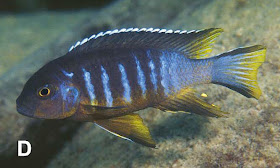Mbuna are rock dwelling Cichlids known only from Lake Malaŵi in East Africa. They are typically colourful Fish, and often sexually dichromic (the males and females are different colours), making them popular in the aquarium trade. Mbunas are social Fish, with each males defending a territory a group of females. They are mouth brooders, with the females incubating the eggs in their mouths, and the newly hatched fry returning to the mothers mouth for shelter when threatened.
In a paper published in the journal Zootaxa on 8 May 2013, Jay Stauffer and Kristin Black of the School of Forest Resources at Pennsylvania State University, and Adrianus Konings of the Cichlid Press describe five new species of Mbuna from Lake Malaŵi, all placed within the genus Metriaclima.
The first new species is named Metriaclima pambazuko, 'pambazuko' being the Swahili word for sunrise, a reference to the orange or red dorsal fins of the males. Metriaclima pambazuko is a 61-75 mm (adult length) Mbuna found around Lundo and Hingi Islands on the Tanzanian part of the lake and Londi Bay on the Mozambique shore. The males are blue with 5-7 black bars the dorsal fin is blue gray or black, shading to yellow, orange or red away from the body. Females are grey-blue or light brown with grey bars.
Metriaclima pambazuko, (top) 70 mm male from Hongi Island, (bottom) 55 mm female from Londo Bay. Stauffer et al. (2013).
The second new species is Metriaclima lundoense, 'lundoense' referring to Lundo Island, the only locality where the Fish was found. Metriaclima lundoense has an adult length of 63-85 mm. The males are blue with black bars, the females light brown with blue and green highlights and (sometimes) faint brown bars.
Metriaclima lundoense, (top) 80 mm male, (bottom) 70 mm female. Both from around Lundo Island. Stauffer et al. (2013).
The third new species described is named Metriaclima midomo, 'midomo' meaning 'lips' in Swahili, the Fish having enlarged lips relative to other members of the genus. Metriaclima midomo has an adult length of 66-99 mm. The males are blue with green highlights and 5-9 black bars, the females are blue with green highlights and 5-7 faint bars. The fish were found only around Lundo Island.
Metriaclima midomo, (top) 80 mm male, (bottom) 70 mm female. Both from around Lundo Island. Stauffer et al. (2013).
The fourth new species is named Metriaclima tarakiki, 'tarakiki' meaning slender in Swahili, the fish being elongate in shape. Metriaclima tarakiki has an adult bodylength of 72-120 mm, the males are blue-white with 7-9 black bars, the females have two colour schemes, some being light brown others being yellow or orange with black blotches. The fish were found around Ngkuyo Island and Higga Reef on the Tanzanian part of the lake.
Metriaclima tarakiki, (top) 110 mm male from Higga Reef, (bottom) 90 mm female from Higga Reef. Stauffer et al. (2013).
The final new species is named Metriaclima nigrodorsalis, 'nigrodorsalis' meaninf 'black-dorsal' in Latin, the males and some females having a black band on the dorsal fin. Metriaclima nigrodorsalis has an adult length of 55-84 mm. This is a variable Fish with several different colour schemes, the males can be light blue, dark blue or yellow, with a yellow or grey belly and 6-10 black bars, the females cna be blue or light brown with grey or dark brown bars. Metriaclima nigrodorsalis was found at N’kolongwe, Thundu, Nkhungu, Chiloelo, and Charlie’s Bay, all on the Mozambican part of the lake.
Metriaclima nigrodorsalis, (top) 75 mm male from N'kolongwe, (upper middle) 70 mm female from N'kolongwe, (lower middle) 75 mm male from Chiloelo, and (bottom) 80 mm male from Nkhungu Point. Stauffer et al. (2013).
Map of Lake Malaŵi, showing locations where Mbuna were sampled in this study. Stauffer et al. (2013).
See also Two new species of Cichlid Fish from Lake Victoria, A new species of Cichlid Fish from Lake Tanganyika and A new species of Cichlid Fish from Lake Malaŵi.
Follow Sciency Thoughts on Facebook.













